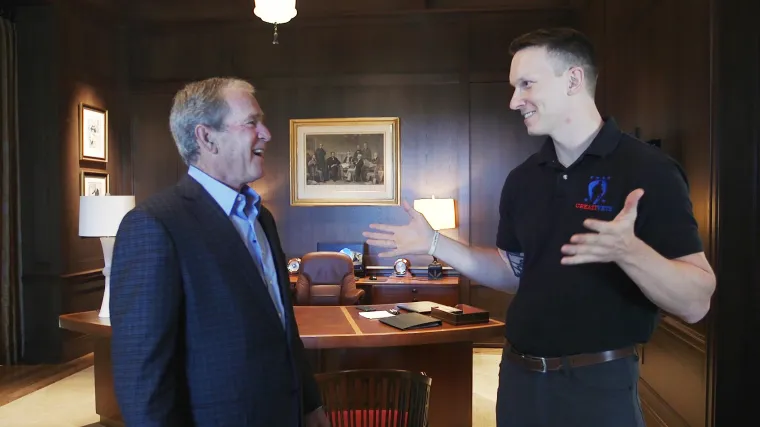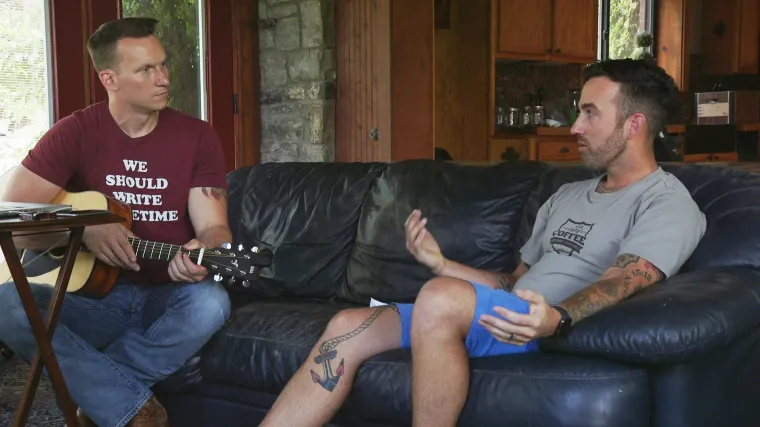‘A Way to Talk About It’
A veteran finds healing in art – AND then Helps others
Directed by Lukas Augustin | Produced by Diane Tsai
Text by Melissa Chan
In Richard Casper’s hometown of Washburn, Ill., he was known as the class clown and the prom king. He was the kid who was always smiling, the teenager who could always make his mother laugh.
That all changed when he joined the U.S. Marines after 9/11 and deployed to Iraq. In December 2006, Casper, then 21, was patrolling with a group of soldiers that included his best friend, 20-year-old Lance Cpl. Luke Yepsen. They were ambushed by gunfire, and Yepsen was shot dead right next to Casper. In the days and months that followed, Casper was consumed with grief for his friend, whose name he tattooed on his left arm.
“For a long time, all my struggles were from Luke passing away,” Casper said recently. “He was shot and killed, and the next day we were working. You just keep going like nothing happened.”
Before the end of that winter, Casper was hit by an improvised explosive device four times and sustained multiple concussions, culminating in traumatic brain injury that finally sent him back home to his family in Washburn. He was suffering from post-traumatic stress, depression and severe anxiety.
“Coming home from war was so degrading. I almost gave up,” Casper said. “I wasn’t able to speak to people. It was beating me up. It was horrible.”
To deal with his suicidal thoughts, Casper sought help from the U.S. Department of Veteran Affairs, but he found that a session with a psychiatrist and the pills he was prescribed made him feel more disconnected. That wasn’t how he wanted to handle his pain.
 Richard Casper, founder of CreatiVets, meets with former president George W. Bush at the George W. Bush Presidential Center in Texas, in Sept. 2017. Andrew King
Richard Casper, founder of CreatiVets, meets with former president George W. Bush at the George W. Bush Presidential Center in Texas, in Sept. 2017. Andrew KingInstead, Casper turned to art. He began taking classes at the School of the Art Institute in Chicago, where he said he could finally relay what he was feeling through paintings and sculptures. In one of his first paintings, Casper depicted himself placing his hand on Yepsen’s tombstone. He colored the grass surrounding the tombstone bright red, a choice that his classmates pointed to as a symbol of his anger and intense emotions.
“I found a way to talk about it without talking about it,” said Casper, 32, who now lives in Nashville with his fiancé. “I dove into art because I felt like it was healing me at that moment.”
In 2013, Casper co-founded CreatiVets, a nonprofit that helps veterans heal through free music and art programs. The group flies veterans to Nashville to collaborate with accomplished songwriters for three days, or to either Chicago or Virginia to study at the School of the Art Institute or Virginia Commonwealth University for three weeks.
Up to 20% of soldiers who served in Iraq or Afghanistan have post-traumatic stress, according to the Department of Veteran Affairs. The idea behind CreatiVets is to give veterans an outlet to open up about their experiences and cope with their war-related trauma. So far, Casper and CreatiVets co-founder Linda Tarrson have helped more than 80 people.
One of those veterans is retired Petty Officer Chris Goehner, who served as a medic in the Navy and has been haunted for more than a decade by the death of a soldier he could not save. In 2005, during his first deployment in Iraq, Goehner was part of a medical team that decided not to treat a wounded Marine, who had a roughly 40% chance of surviving, so that they could save other lives.
 Richard Casper and retired Petty Officer Chris Goehner during a CreatiVets songwriting session in July, 2017. Lukas Augustin
Richard Casper and retired Petty Officer Chris Goehner during a CreatiVets songwriting session in July, 2017. Lukas Augustin“I had his dog tags in my hands when they said, ‘We’re going to let him go,’” Goehner said in TIME’s new short documentary, Evidence of Things Unseen. The veteran broke down as he recounted the incident to Casper and a team of songwriters in Nashville over the summer.
“Why did he pass? He had a wife who was a Marine. My wife left me. She thought the PSTD would never get better. Why do I get to survive?” Goehner said as the CreatiVets team listened quietly.
Songwriter Brandon Kinney and singer-songwriter Jacob Powell then turned Goehner’s wrenching experience into a mournful country song. It’s written in the perspective of the fallen soldier, who offers absolution to the medics who couldn’t save his live. Powell performed the song at the Listening Room Café in Nashville in July, with Casper and Goehner in the audience.
“Don’t let my choices be the voices that you hear when you’re alone. Live your life, quit asking why and just grow old,” Powell sang.
Goehner cried and smiled while he listened to the song. “It was the biggest mix of emotions hearing the songwriters talking about the darkest time that I — I don’t talk about,” he said. “I’m just so happy that finally this negative experience may have some positive.”
In September, Casper’s work was recognized by former President George W. Bush, who has painted dozens of portraits of service members and veterans for a book published earlier this year.
Casper had guarded Bush for more than a year at Camp David before he volunteered to go into combat, although the two only had a few brief encounters during that time.
“A guy such as yourself got a Ph.D. in life,” Bush told Casper at the George W. Bush Presidential Center in Texas, during a meeting arranged by TIME. “Personal responsibility. Discipline. Worrying about somebody else. You’re going to be one of the really important assets to the future of this country.”
Now Casper hopes to grow his program and continue using the power of art to help other veterans thrive.
“Art ended up changing my life,” he said.
Diane Tsai, who produced this short documentary, is a Video Producer for TIME. Follow her on Instagram @dianetsai_ .
Lukas Augustin, who directed this short documentary, is a filmmaker and journalist based in Berlin.